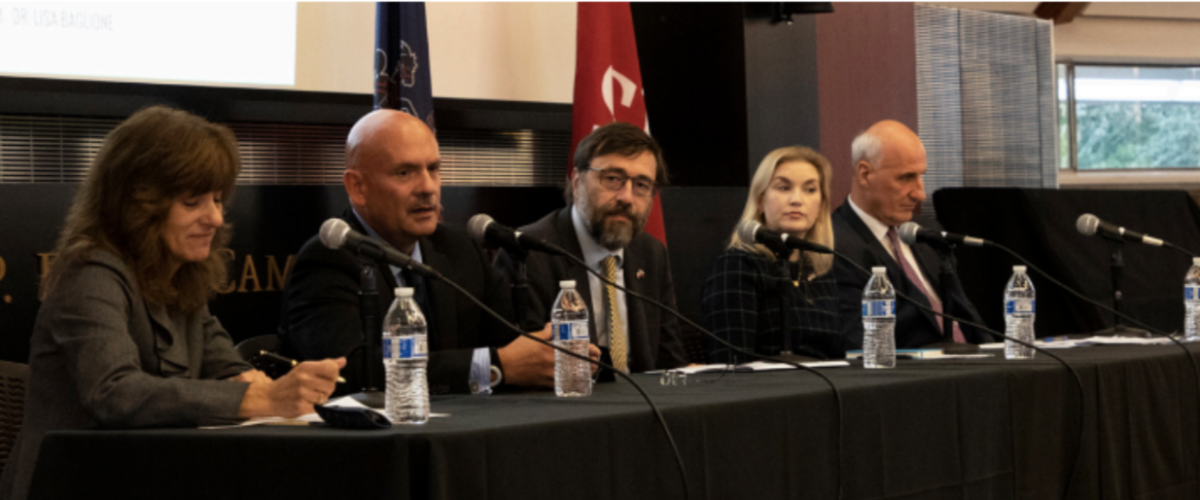St. Joe’s welcomed four dignitaries from the European Union (EU) on Oct. 3: Ambassador of Croatia Pjer Simunovic, Ambassador of the Slovak Republic Radovan Javorcik, Deputy Chief of Mission of Ireland Orla Keane and Deputy Chief of Mission of Greece, Theodoros Bizakis.
The visitors are part of a convoy of EU officials. They are traveling to various cities in the U.S. in an effort to build transatlantic unity in the face of challenges such as the Russian invasion of Ukraine, the threat to democracy and climate change.
“We’ve had to tackle a lot of big issues, most notably the war in Ukraine,” Keane said. “I think the fact that the U.S. government at this time wants to work with the European Union, I think it’s very positive. So it’s a good time for transatlantic relations.”
The visit to St. Joe’s was organized by the European External Action Service (EEAS), the EU’s diplomatic service. Established in 2011, the EEAS carries out the EU’s Common Foreign and Security Policy to promote peace, prosperity, security and the interests of Europeans across the globe.
The event took place in the Cardinal Foley Center on the Hawk Hill campus and was organized by Lisa A. Baglione, Ph.D., professor of political science and a member of the International Relations Program.
During the visit, the ambassadors talked to St. Joe’s students about the ongoing armed conflict in Ukraine and how it is affecting the rest of Europe.
“The energy crisis is probably the most difficult challenge that we’re facing, with energy prices going up and then in turn affecting the cost of living throughout the EU,” Keane told The Hawk in an interview after the presentation.
Prior to Russia’s invasion of Ukraine, over 40% of the EU’s gas came from Russia according to data from the International Energy Agency (IEA). On June 3, the EU adopted sanctions that included a partial embargo on Russian oil. The EU has indicated that it will eventually halt crude oil purchase from Russia.
Keane said the second biggest challenge for the EU is the refugee crisis in Europe.
There have been a reported 6.6 million people in Ukraine have been displaced within the country since the start of the war, and 6.3 million people have left Ukraine to go to neighboring countries according to USA for UNHCR, a U.S. nonprofit based in Washington, D.C.
Keane said Ireland alone has taken in 50,000 refugees.
“At the moment, we’ve seen a lot of solidarity within the EU on these issues, and I hope and expect that it will continue,” Keane said.
The dignitaries were critical of Vladamir Putin and his invasion of Ukraine and called for unity in order to stop him.
“If you have a bully in your classroom, if you’re not united as a classroom against the bully, the bully will win, and that’s what’s happening in Europe and the world,” Javorcik told the audience. “We have one bully sitting in the Kremlin, isolated probably. And he’s just giving orders to kill everybody who doesn’t agree with him that Ukraine is not a nation. So we have to be united to not give up to
this bully.”
Kylie Williams ’23 who attended the event said she learned a lot about the individual perspectives of each of the nations.
“I learned a lot about the individual perspectives of each of the nations,” Williams said. “I’m in the European politics class. And that’s something we talk about a lot is the individual identity.”
Baglione said she hopes the event will get people who do not normally pay attention to world news to think about how these issues affect them.
“Their coming here, I hope, will help more Americans understand that this far off conflict is important to them,” said Baglione. “I’m hoping that St. Joseph students will come and learn that these things are not just esoteric. They’re essential for us as Americans and for our future.”















































